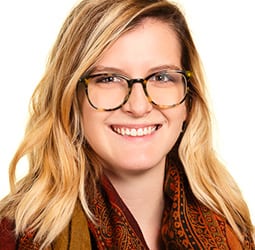When Adina Solomon graduated from the University of Georgia in 2012, she never imagined she’d end up a freelance journalist covering the death industry.
“I would never have been able to guess that, but I love it,” she says, laughing.
It has been an eclectic journey to where she is today. She fell in love with journalism while in college, writing for the student newspaper. She enjoyed finding out things and learning new information about the world each day.
After graduation, she went to work for an aviation trade publication. From there, she taught English in France to high school students. When she returned to the States, she went to work at another trade publication, but wasn’t enjoying it.
“I started thinking, ‘Well, maybe I’m not cut out for journalism,’” she says. She left for a job outside of the industry, deciding to try to live without journalism. She almost immediately began freelancing on the side.
“I loved journalism too much to leave it,” she says.
Her side business taught her the business side of freelancing. Soon, she hit the point where she was turning down freelance work because of her full-time job.
After the 2016 election cycle ended, she decided to branch out on her own and give full-time freelancing a try. She had to learn how to set her own goals and become her own boss. “The best part is obviously the complete freedom – I can choose what I’m going to do each day, what stories I want to do, what topics. I can say no to something if I don’t want to do it. The worst part is the unknowns behind it. You have to constantly ask to get paid and try to maintain a certain income stream.”
She works to tell overlooked stories. After almost a year of research and interviews, including an extensive reporting trip, she published a longform story on the Atlantic Coast Pipeline, a 594-mile natural gas line. It will run from West Virginia to a terminus in Robeson County, North Carolina — the ancestral land of the Lumbee tribe, the largest Native American community east of the Mississippi River.
Along with her co-author, Adina reported on how this pipeline is affecting the Lumbees and their homeland. Two days after the story was published, the Lumbee Tribal Council (which had remained silent about the pipeline since it was announced 3.5 years earlier) passed a resolution to join a lawsuit against the pipeline.
Her bylines are also featured in such publications as: The Washington Post, U.S. News & World Report, The Atlantic‘s CityLab, The Bitter Southerner, Smithsonian magazine, Fast Company, Vice’s Broadly, Atlanta Journal-Constitution brand, HowStuffWorks, WABE (Atlanta’s NPR station), Atlanta Magazine, TASTE, The Forward, Paste Magazine and Crain’s.
She structures her days around her to-do list, beginning the day with a workout and then building out her goals for the day. She details how many pitches, transcriptions or stories she needs to complete that day, and then she gets to work.
Her foray into the death industry has been especially interesting to her. “I thought that would be a finite topic, but it’s opened up a lot of storytelling I hadn’t thought of before,” she says. She has written about women in the funeral industry, a profile on a headstone carver and the economics of paying for a funeral.
Her advice to budding journalists is to keep an open mind. “I’ve talked to a lot of students who are close to graduating and they all want some kind of big editorship in New York or Washington, D.C.,” she says. “But there’s a lot more out there.”

Contributing writer

